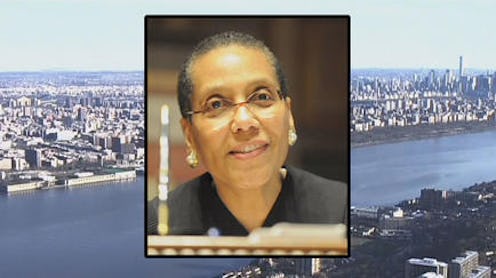News
Why People Are Speculating About Sheila Abdus-Salaam

On the night of April 12, news broke that New York Judge Sheila Abdus-Salaam was found dead. Abdus-Salaam was the first black female judge on New York's Court of Appeals, and her death has been met with shock and sadness. The few details we do know are stomach-turning enough, but speculation about the cause of Abdus-Salaam's death is rampant.
Abdus-Salaam served as an associate judge on the New York State Court of Appeals since 2013, and was described by New York Gov. Andrew Cuomo as a "trailblazing jurist and a force for good" in his statement of condolence on Twitter. Prior to being appointed to the appeals court by Cuomo, Abdus-Salaam worked as an attorney and served as New York's assistant attorney general. Her career on both sides of the bench was incredibly important, and with reports that police suspect no foul play in her death, many are questioning whether this well-respected judge took her own life.
The basis for this sort of speculation stems not only from a distrust of police, but also from what many believe to be a trend of authorities hastily ruling black deaths suicides. There have been multiple cases in recent years that some believe corroborate this trend, the most infamous of which being the jailhouse death of Sandra Bland. Bland's death was ruled a suicide, but her family and many others don't believe she died that way.
Paired with the Black Lives Matter call to "say her name," speculation about the cause of Judge Abdus-Salaam's death points to an understandable desire to find justice for people whose lives are too often boiled down to a hashtag and some identifiers.
Her death isn't the first in the region whose reported cause of death has been disputed — this time last year, the family of Gugsa Abraham Dabela, a black lawyer from Connecticut, filed a lawsuit against police claiming that they failed to investigate his death fully because of his race.
Speculation online about the early reported cause of Abdus-Salaam's death is much more than a litmus test for one's opinions on the police — it comes from a place of weariness about black death, a desire to see justice, and, perhaps most importantly, a desire to see this important judge's legacy honor.
She was so much more than a judge: She was a whole person whose life and work cannot be simplified in a brief obituary or dismissed based on her believed cause of death. Regardless of cause, her death is a tragedy, and those speculating about the reported cause deserve respect in their mourning, too.
Correction: An earlier version of this article stated that Abdus-Salaam was Muslim. This is incorrect. Her husband was Muslim, and she took his last name, though she never officially converted to Islam.